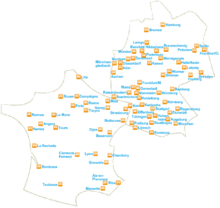Franco-German University
The Franco-German University (FGU, French: Université franco-allemande (UFA), German: Deutsch-Französische Hochschule (DFH)) is an international organisation of universities from Germany and France with the purpose of facilitating international cooperation in higher education.[1] The FGU is not a university in its own right, but rather enables students to study at multiple universities in both countries in a Franco-German course of study, leading to a double degree.[3]
Université franco-allemande Deutsch-Französische Hochschule | |
 | |
| Abbreviation | UFA / DFH / FGU |
|---|---|
| Predecessor | Franco-German College for Higher Education |
| Formation | 19 September 1999 |
| Type | Intergovernmental organisation |
| Legal status | Statutory corporation |
| Headquarters | Saarbrücken, Saarland, Germany[1] |
Region served | France and Germany, Europe |
| Fields | Higher education |
Membership (2016/17) | 185 universities and colleges |
Official languages | French and German |
President | Prof. Dr. Dr. h. c. David Capitant |
Vice President | Prof. Dr. Olivier Mentz |
Parent organization | Federal Ministry of Education and Research (Germany), Ministry of National Education (France) |
Budget (2016) | 13,600,000 Euros[2] |
| Website | dfh-ufa |

History and organisation
In a first attempt at higher education cooperation, a Franco-German College for Higher Education (German: Deutsch-Französisches Hochschulkolleg, French: Collège franco-allemand pour l'enseignement supérieur) had existed since 1988. That organisation had similar goals, working to promote international academic cooperation and student exchanges.[4][5]
At the September 1997 Franco-German Summit in Weimar, the French and German governments concluded the Weimar Agreement,[6] deciding to establish the Franco-German University with the intention of international cooperation. The agreement came into effect two years later when the Franco-German University was formally founded.[1]
The organisation is headed in day-to-day administration by a President and a Vice President, of whom one is always French and one is German; and a secretarial office in Saarbrücken. A primary governing body is the University Council, composed of 22 politicians, scientists, industry representatives and other experts from both countries. All full member institutions of the FGU are directly represented in the Assembly of Member Universities, gathering for yearly meetings.[1]
Funding for the FGU is provided by the French and German governments equally, and has steadily been increased since the institution's early days.[7]
Activity
The university primarily enables double degrees at French and German universities, international doctorates, and cooperative research projects; supporting mobility and communication between the countries.[7]
In 2016 the Franco-German University was responsible for more than 6,000 students in 177 courses of study. Most students come from either France or Germany, but some foreign students participate as well.[3] Out of the FGU's 185 member or partner universities and colleges (including grandes écoles and Fachhochschulen in addition to traditional universities), 22 partner institutions are located in third countries — predominantly in Europe, but also Canada, Japan and Morocco.[8]
The university has been called "a remarkable umbrella organization enabling numerous French and German higher education institutions to successfully cooperate in all research areas" by the director of the Franco-German Institute Frank Baasner,[9] and its contribution to the history of Franco-German cooperation recognised.[10]
See also
- Education in the European Union
- Erasmus Programme and Erasmus+
References
- "Franco-German University - facts & figures". dfh-ufa.org. Archived from the original on 1 March 2018. Retrieved 1 March 2018.
- "Deutschland und Frankreich erhöhen Budget der DFH" (in German). Saarbrücker Zeitung. 2 May 2016. Retrieved 1 March 2018.
- "Deutsch-Französische Hochschule: 6.000 sagen "Ja" und "Oui"" (in German). Informationen aus dem Institut der deutschen Wirtschaft. 22 January 2018. Retrieved 2 March 2018.
- Dr. Elisabeth Zuber-Knost (16 July 1998). "10 Jahre Deutsch-Französisches Hochschulkolleg" (Press release) (in German). University of Karlsruhe. Retrieved 4 March 2018.
- Antoine Vion (2013). "French-German Friendship" (PDF). Academic Foresights. Retrieved 4 March 2018. Cite journal requires
|journal=(help) - "Abkommen zwischen der Regierung der Bundesrepublik Deutschland und der Regierung der Französischen Republik über die Gründung einer Deutsch-Französischen Hochschule (Weimarer Abkommen)" (in German). Retrieved 1 March 2018.
"Accord entre le Gouvernement de la République française et le Gouvernement de la République fédérale d'Allemagne relatif à la création de l'Université franco-allemande (Accord de Weimar)" (in French). Retrieved 1 March 2018. - "The Franco-German University - UFA". abg.asso.fr. Association Bernard Gregory. Retrieved 1 March 2018.
- Yearly Report 2016 (PDF) (Report) (in French and German). Franco-German University. Retrieved 1 March 2018.
- Andreas Noll (22 January 2018). "France, Germany mark Elysee Treaty with resolution to step up cooperation". Deutsche Welle. Retrieved 1 March 2018.
- Ulrich Krotz; Joachim Schild (22 February 2013). "The Franco-German connection and the future of Europe". Oxford University Press blog. Retrieved 1 March 2018.